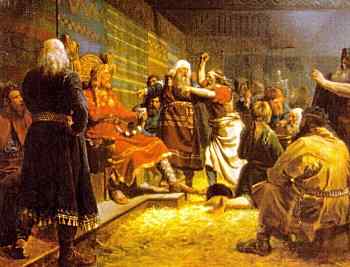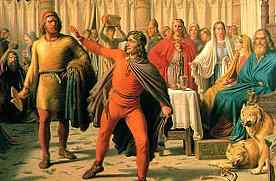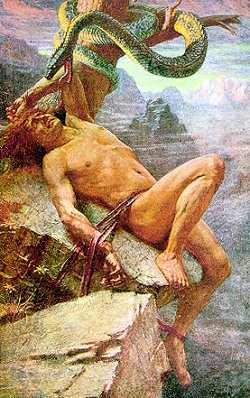
|

|
Loki's Flyting and Loki's Binding
 Some
time after the death of Baldr, many of the gods went to Ægir's hall on
the island of Hlesey for a feast. Using his enormous kettle, Ægir
brewed oceans of ale for his guests. Many of the Æsir were
present, including Loki. Horns were kept full of ale, and the
hall was filled with a great peace.
Some
time after the death of Baldr, many of the gods went to Ægir's hall on
the island of Hlesey for a feast. Using his enormous kettle, Ægir
brewed oceans of ale for his guests. Many of the Æsir were
present, including Loki. Horns were kept full of ale, and the
hall was filled with a great peace.
Loki couldn't stand the praise being heaped on Ægir's servant, Fimafengr, and killed him. The outraged Æsir took up their arms and chased Loki out of the hall into the surrounding forest. Eventually, the gods returned to the hall and resumed their places. Outside, Loki quarreled with Eldir, another servant, for re-admittance to the hall, promising that before the end of the feast, he'd blend the gods' mead with malice. As Loki entered the hall, the conversation stopped, and the hall fell silent.
Told that he was not welcome, Loki reminded Óðin of his promise, made when the two became blood-brothers: to drink only if a drink was brought to both.
A horn was brought to Loki, who began a flyting (the traditional Norse exchange of insults) with the assembled gods and goddesses. None escaped his insults and his cruel taunts. Bragi was accused of cowardice; Freyja of being a whore; Óðin of being womanly and of being guilty of disgraceful behavior; Frigg and Sif of being adulterers; Njorð of permitting his mouth to be used as a chamberpot by the giants; Freyr of buying his wife; Heimdall of being a menial servant; and Þór of being a coward.
 Þór
could take no more. He threatened Loki's life with his hammer.
Loki turned to leave the hall, prophesying, "You'll never
hold another feast such as this. Your hall will be burned by fire, and everything you
own destroyed. Flames will play on your back."
Þór
could take no more. He threatened Loki's life with his hammer.
Loki turned to leave the hall, prophesying, "You'll never
hold another feast such as this. Your hall will be burned by fire, and everything you
own destroyed. Flames will play on your back."
Loki knew that his days in Ásgarð were over. He was certain that the Æsir would avenge Baldr's death, so he fled. He traveled to a remote, deserted portion of Miðgarð. There, in a hollow near Franang's Falls, he built a low house, so that no one could see him, having doors in all four walls so he could watch in all four directions.
Meanwhile, the gods decided that, like Fenris-wolf, Loki must be bound. A party was sent out to do the job.
When
Loki heard the sounds of the approaching Æsir, he turned
himself into the shape of a salmon and jumped into the nearby
river. But Kvasir, the wisest of the Æsir, saw some ashes
on the hearth where Loki had burned a net. He realized that this
was the way to catch Loki. They made a net, and on the third attempt,
they caught him.
 They
took Loki to a cave and bound him to three great rocks by the entrails
of his son, Nari. Skaði took a venomous serpent and placed it over Loki's face.
The serpent drips poison down onto his face. Loki's wife, Sigyn,
catches the venom in a bowl. But when she leaves to empty the
bowl, Loki writhes in pain, shaking the earth, and this is the cause of earthquakes.
They
took Loki to a cave and bound him to three great rocks by the entrails
of his son, Nari. Skaði took a venomous serpent and placed it over Loki's face.
The serpent drips poison down onto his face. Loki's wife, Sigyn,
catches the venom in a bowl. But when she leaves to empty the
bowl, Loki writhes in pain, shaking the earth, and this is the cause of earthquakes.
Here, Loki will lie until Ragnarök.
|
Lokasenna, the story of Loki's flyting, makes for very humorous reading. The taunts and insults are viciously cruel, but right on the mark. The very worst aspects of each of the assembled gods and goddesses are highlighted and ridiculed by Loki's gibes. Some of Loki's insults refer to incidents that don't survive in any of the stories. Once again, we are reminded of how much of the Norse literature has been lost. However, some scholars believe that the incidents to which Loki refers are not lost. Rather, they speculate that the stories may never have existed and that Loki fabricated the incidents on the spot simply to be libelous. The portion of the story in which Loki kills the servant, and then leaves and re-enters the hall exists only in the prose introduction to the poem, which was probably added later. The muddled nature of the plot in the prose introduction suggests that the author of the prose did not understand the poem. |
|
|
©1999-2025 William R. Short |